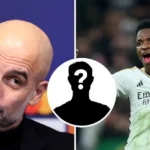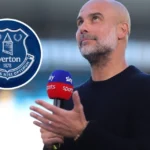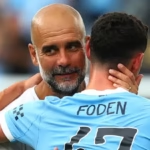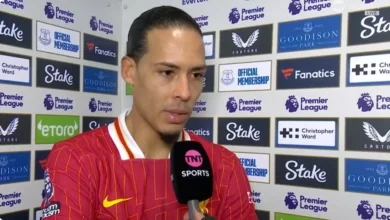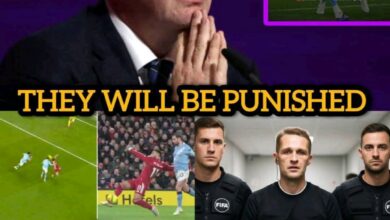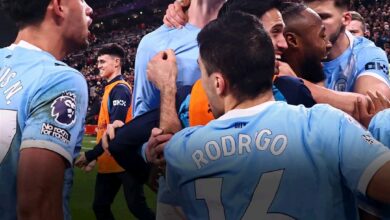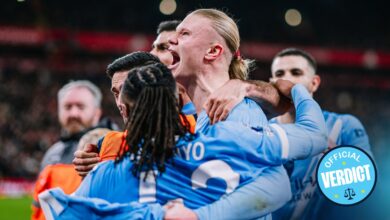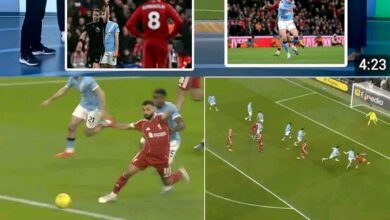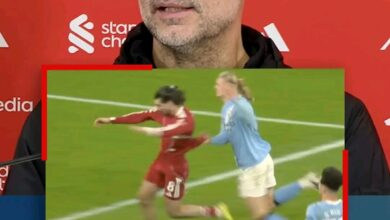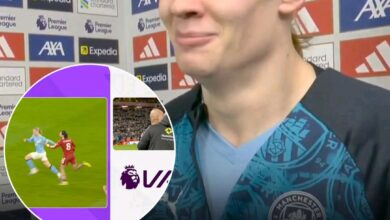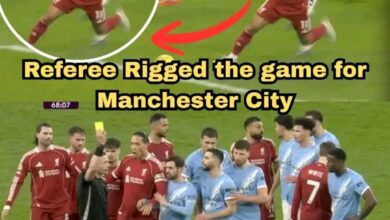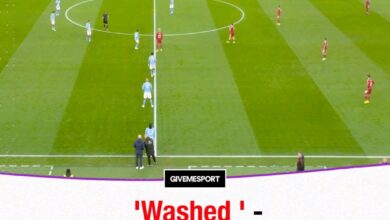Pep Guardiola’s Tactical Shift: The Jeremy Doku Situation at Manchester City

In a candid moment of self-reflection that has become increasingly characteristic of his managerial style in recent seasons, Manchester City boss Pep Guardiola has publicly apologized to Belgian winger Jeremy Doku, admitting he’s been “so unfair” to the talented attacker. This rare acknowledgment from one of football’s most celebrated tacticians offers a fascinating window into the delicate balancing act of squad management at the elite level, where even world-class players can find themselves on the periphery due to tactical considerations rather than any fault of their own.
Following Manchester City’s 2-0 victory over Everton at Goodison Park on Saturday, Guardiola didn’t shy away from addressing his recent treatment of Doku. “I’ve been so unfair with him in the last games,” the Catalan manager admitted in his post-match press conference, his expression conveying genuine regret. “I remember the games against Spurs away and Brighton, for example. Without him, it would not have been possible.”
This admission came after Doku’s game-changing substitute appearance against Everton, where the Belgian international entered the fray with the scoreline deadlocked at 0-0 and played a pivotal role in propelling City to victory. His direct running, close control, and willingness to take on defenders provided exactly the spark that City had been missing, reinforcing the question of why such a talented player had been consigned to the bench in the first place.
To understand Doku’s situation, one must first appreciate the tactical evolution that Manchester City has undergone since the March international break. Guardiola has implemented a significant shift in his approach—one that has prioritized defensive solidity and possession retention over the explosive wing play that had previously been a hallmark of City’s attack.
This new system places greater emphasis on midfielders skilled at maintaining possession through relentless sequences of short passes, allowing City to exert greater control over matches. Full-backs have been tasked with providing width rather than traditional wingers, with the team increasingly focused on building attacks through the central areas of the pitch rather than exploiting the flanks.
This methodical approach has proven effective in many ways, helping City maintain their challenge for multiple trophies as they enter the business end of the season. However, it has also meant reduced opportunities for players like Doku and fellow winger Savinho, whose primary strengths lie in their ability to beat opponents in one-on-one situations on the wing.
“The only reason that they have not played lately is because we didn’t attack in the last games with wingers,” Guardiola explained, providing tactical context for his decisions. “We were more full-backs wide, and more players in the middle like [against] Bournemouth.”
What makes Guardiola’s apology particularly noteworthy is the implicit acknowledgment of Doku’s unique qualities. Since joining Manchester City from Rennes in the summer of 2023 for a reported fee of £55.5 million, the Belgian winger has established himself as one of the Premier League’s most electrifying talents. His blistering pace, exceptional close control, and ability to beat defenders in tight spaces make him a nightmare for opposition defenders.
Guardiola himself was effusive in his praise: “Jeremy in the final third is unstoppable, he’s an incredible, incredible football player.” The repetition of “incredible” underscores the manager’s genuine admiration for Doku’s abilities, making his recent exclusion from the starting lineup all the more puzzling to outside observers.
The impact of Doku’s introduction against Everton was immediate and transformative. After a largely stale first half where City struggled to break down a well-organized Everton defense, Doku’s directness and willingness to take risks provided the cutting edge that had previously been missing. His ability to drop the shoulder and accelerate past defenders created spaces that simply hadn’t existed before his introduction.
“Today the impact has been much, much better than Old Trafford,” Guardiola noted, comparing Doku’s substitute appearance at Goodison Park to his previous outing against Manchester United. “Old Trafford was not good, and here the impact was, you know, how the ball dropped the team, and his threat, arriving to the byline.”
Guardiola’s apology to Doku highlights one of the most challenging aspects of managing an elite football club in the modern era: balancing tactical necessities with player morale and development. At Manchester City, where the squad is packed with world-class talent in virtually every position, difficult decisions regarding team selection are inevitable.
For a player of Doku’s caliber, who would be an automatic starter at most Premier League clubs, accepting a reduced role can be challenging. The psychological impact of being relegated to the bench after previously influential performances requires careful management, especially for younger players still establishing themselves at the highest level.
Guardiola’s public acknowledgment of his “unfair” treatment serves multiple purposes. It validates Doku’s frustrations, provides context for the decisions, and reaffirms the player’s importance to the squad despite his recent reduced playing time. This kind of transparent communication can be crucial in maintaining harmony within a group of highly competitive professional athletes.
“I feel sorry for him and for other ones,” Guardiola added, extending his empathy to other squad members who have found themselves in similar situations. This collective approach to addressing the issue demonstrates Guardiola’s awareness that his tactical decisions affect multiple players, not just Doku
Manchester City’s evolving tactical approach this season must be viewed within the context of their Premier League title defense and their pursuit of multiple trophies. Having claimed an unprecedented treble last season (Premier League, FA Cup, and Champions League), the pressure to maintain such extraordinary standards has been immense.
The tactical shift toward greater control and defensive stability has coincided with a period of significant challenge from rivals Liverpool and Arsenal, who have both pushed City harder than in previous seasons. In such a competitive environment, Guardiola’s pragmatic adjustments reflect his recognition that winning ugly is sometimes necessary in a grueling campaign.
The evolution of City’s style has also been influenced by personnel changes and injuries throughout the season. The departures of key players like Ilkay Gündogan and Riyad Mahrez necessitated adaptations, while injuries to important figures such as Rodri and Kevin De Bruyne at various points have required tactical flexibility.
In this context, the temporary sidelining of Doku represents one piece of a much larger tactical puzzle. Guardiola’s willingness to acknowledge the personal cost of these decisions—particularly to a player who has proven himself valuable to the team—speaks to his emotional intelligence as a manager.
As Manchester City enters the final stretch of the season, Guardiola faces a delicate balancing act regarding Doku’s role. The Belgian’s impact as a substitute against Everton provides a compelling case for greater involvement, yet the tactical setup that has brought City success in recent weeks has largely marginalized traditional wingers.
The solution may lie in situational deployment rather than a wholesale return to a previous system. Doku’s game-changing ability makes him an ideal impact substitute against tiring defenses, as demonstrated at Goodison Park. However, his undeniable talent also merits consideration for starting roles, particularly in matches where City might benefit from his direct approach from the outset.
One possible compromise would be a hybrid approach, with Doku starting in certain fixtures where his specific attributes might be particularly valuable, while accepting a role as a “super sub” in others. Such flexible deployment would allow Guardiola to maintain his preferred tactical framework while still maximizing Doku’s contribution to the team.
At just 22 years old, Jeremy Doku represents both the present and future of Manchester City. His exceptional technical ability, combined with physical attributes that cannot be coached, make him a rare talent in world football. Despite the current tactical considerations limiting his playing time, there is little doubt that Doku features prominently in City’s long-term plans.
This season should be viewed as part of Doku’s development journey rather than a definitive statement about his standing at the club. Like many young players who have thrived under Guardiola—Phil Foden being a prime example—Doku’s path to becoming a regular starter may involve periods of reduced playing time as he continues to develop tactically and physically.
Guardiola’s track record of developing young talent suggests that this temporary reduction in Doku’s role is likely part of a longer-term development strategy rather than an indication of diminished faith in the player’s abilities. The manager’s effusive praise and public apology reinforce this interpretation.
Guardiola’s apology to Doku also offers insight into his own evolution as a manager. Now in his eighth season at Manchester City, the Catalan has shown increasing willingness to publicly acknowledge mistakes and shortcomings—a stark contrast to the more rigid, unyielding persona he sometimes projected in his earlier managerial career.
This growth reflects the maturation of a coach who has adapted to the challenges of the Premier League and the specific demands of managing a club like Manchester City. The emotional intelligence displayed in his handling of the Doku situation demonstrates an understanding that modern management extends far beyond tactical decisions and training methods—it encompasses psychology, communication, and relationship building.
As City continues its pursuit of domestic and European success under Guardiola’s leadership, this more nuanced approach to player management may prove just as important as his tactical innovations. The ability to keep a squad of world-class players motivated and engaged, even during periods of limited playing time, represents a critical skill for any manager seeking sustained success at the elite level.
The Jeremy Doku situation at Manchester City encapsulates the complexities of modern football management. Even for a tactical genius like Guardiola, balancing the needs of the team with the development and happiness of individual players remains a perpetual challenge.
Doku’s game-changing performance against Everton served as a timely reminder of his exceptional talent and the valuable contribution he can make to City’s campaign. Guardiola’s willingness to publicly acknowledge his “unfair” treatment of the Belgian international demonstrates both his humility as a manager and his recognition of Doku’s importance to the squad.
As Manchester City continues its pursuit of multiple trophies, finding the optimal role for a player of Doku’s caliber will be crucial. The Belgian’s unique skill set provides options that few other players in world football can offer, making him an invaluable resource for Guardiola’s team regardless of whether he starts matches or enters as a substitute.
In a sport increasingly defined by marginal gains and tactical nuance, the human element remains paramount. Guardiola’s handling of the Doku situation exemplifies the delicate balance between tactical pragmatism and player management that defines elite-level coaching in the modern era. It’s a reminder that behind the tactical boards and statistical analyses, football remains a fundamentally human endeavor—one where relationships, communication, and emotional intelligence can be just as decisive as technical ability and tactical acumen.
As City enters the final crucial weeks of the season, Doku’s role will be worth monitoring closely. If his impact against Everton is any indication, the Belgian winger could yet play a defining role in determining whether Guardiola’s side can maintain their grip on the Premier League title and pursue further glory in the Champions League. Whether as a starter or a game-changing substitute, Doku’s electrifying talent ensures he will remain a central figure in Manchester City’s present and future ambitions.


